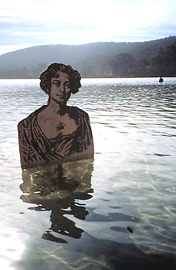Module 3 Weblog #3 (A. Davidson)
Julie Gough – Tasmanian Aboriginal visual artist
& Julie Gough’s Website
Description & Relevancy
These sites highlight the artistic pursuits of Julie Gough and the themes that she explores through her artwork. There are links to her various works of art, writing, and reviews. When considering the focus in this module on the impact of outside researchers on indigenous communities I was deeply interested in the following piece and description….
 The Whispering Sands (Ebb Tide), 1998
The Whispering Sands (Ebb Tide), 1998
mixed media, dimensions variable
photograph courtesy the artist
The Whispering Sands (Ebb Tide) installation comprises sixteen lifesize portraits pyrographically (hand-burnt) onto 5 mm plywood. These figures were placed in the tidal flats at Eaglehawk Neck, Southern Tasmania during November 1998 in the ‘Sculpture by the Sea’ Exhibition. The portraits represent British individuals, collectors, who historically and subsequently impacted on Tasmanian Aboriginal people through their accumulation of material culture, stories, anthropological/medical information, human remains, and even Aboriginal children in the names of science, education, history, anthropology and the increase of their own personal status and power.
Links
http://www.anu.edu.au/culture/abstractions/artists/jg_1.htm
October 27, 2009 No Comments
Module 3 Weblog #2 (A. Davidson)
FNEHIN
First Nations Environmental Health Innovations Network
Research Ethics Protocols and Guidelines (Page)
Description & Relevancy
This page is part of the broader website of the First Nations Environmental Health Innovations Network that endevours to:
“…have a central role in knowledge transfer, facilitating research partnerships, and showcasing best practices in environmental health research with First Nations.”
The page highlights the existing major concerns related to research practice in First Nations communities and frames the idea that each community is unique and a variety of research methods and protocols are being developed to address the sorry past of research in First Nations communities. As well, this page includes a great number of links to Aboriginal groups and organizations that have developed research protocols and guidelines for conducting research with indigenous populations.
Links
October 27, 2009 No Comments
Module 3 Weblog #1 (A. Davidson)
Ownership, Control, Access, and Possession (OCAP) or Self-Determination Applied to Research:
Description & Relevancy
This paper explores the themes and questions we are examining related to research ethics and indigenous communities. The paper highlights where past research practices have been conducted from a colonial perspective and is critical of the research relations with Aboriginal people in the past that has, among other things, violated community cultural expectations. Following this review of past practice the paper then chronicles improvements in the ethics of First Nations research and how OCAP offers some options for improving the relationship between indigenous communities and academic research.
Interestingly, throughout the paper, there are a number of excellent artistic representations of the dilemmas that have plagued research into First Nations Communities. I found these to be quite helpful in synthesizing some of the big issues in this field.
Links
http://www.research.utoronto.ca/ethics/pdf/human/nonspecific/OCAP%20principles.pdf
October 27, 2009 No Comments
